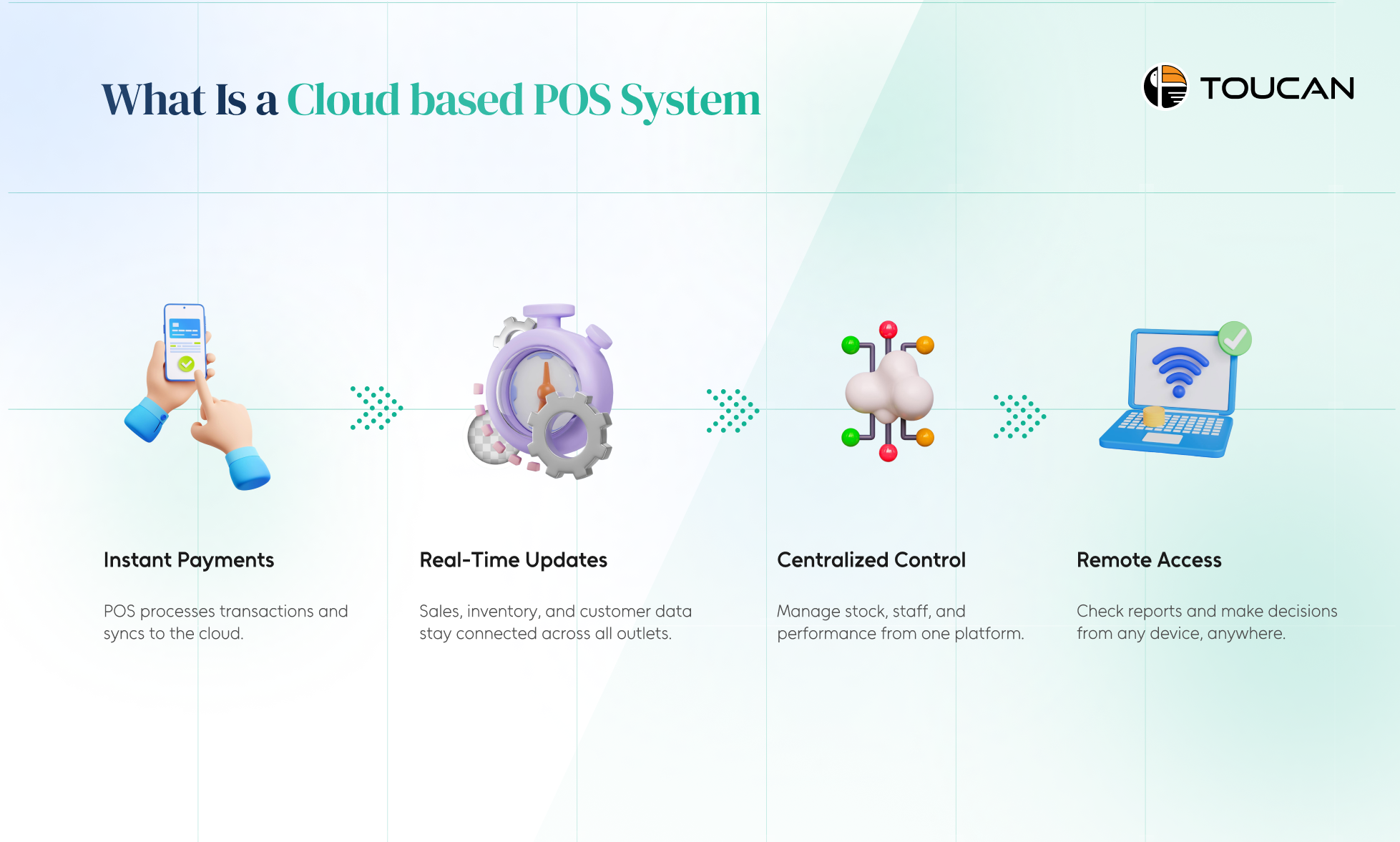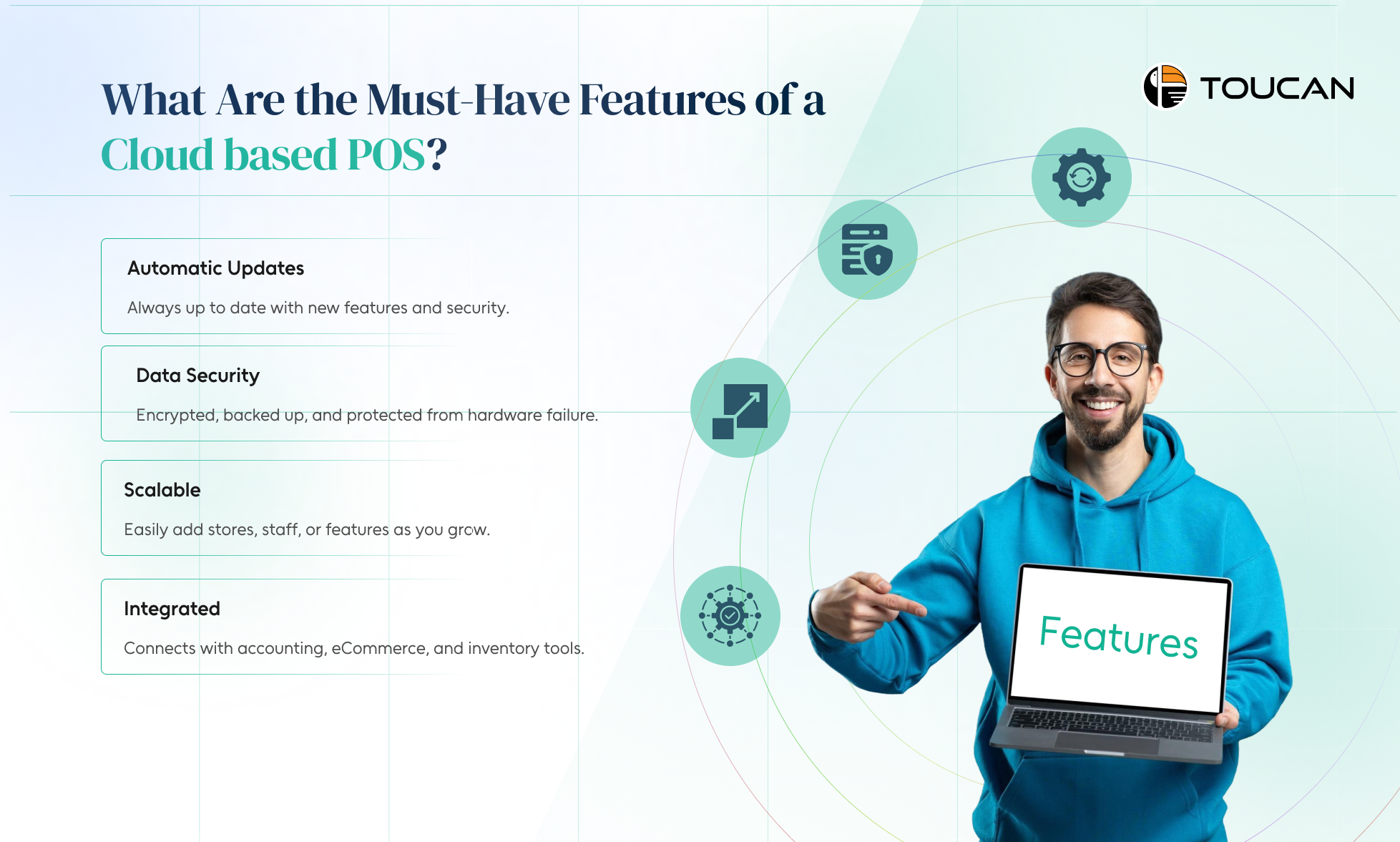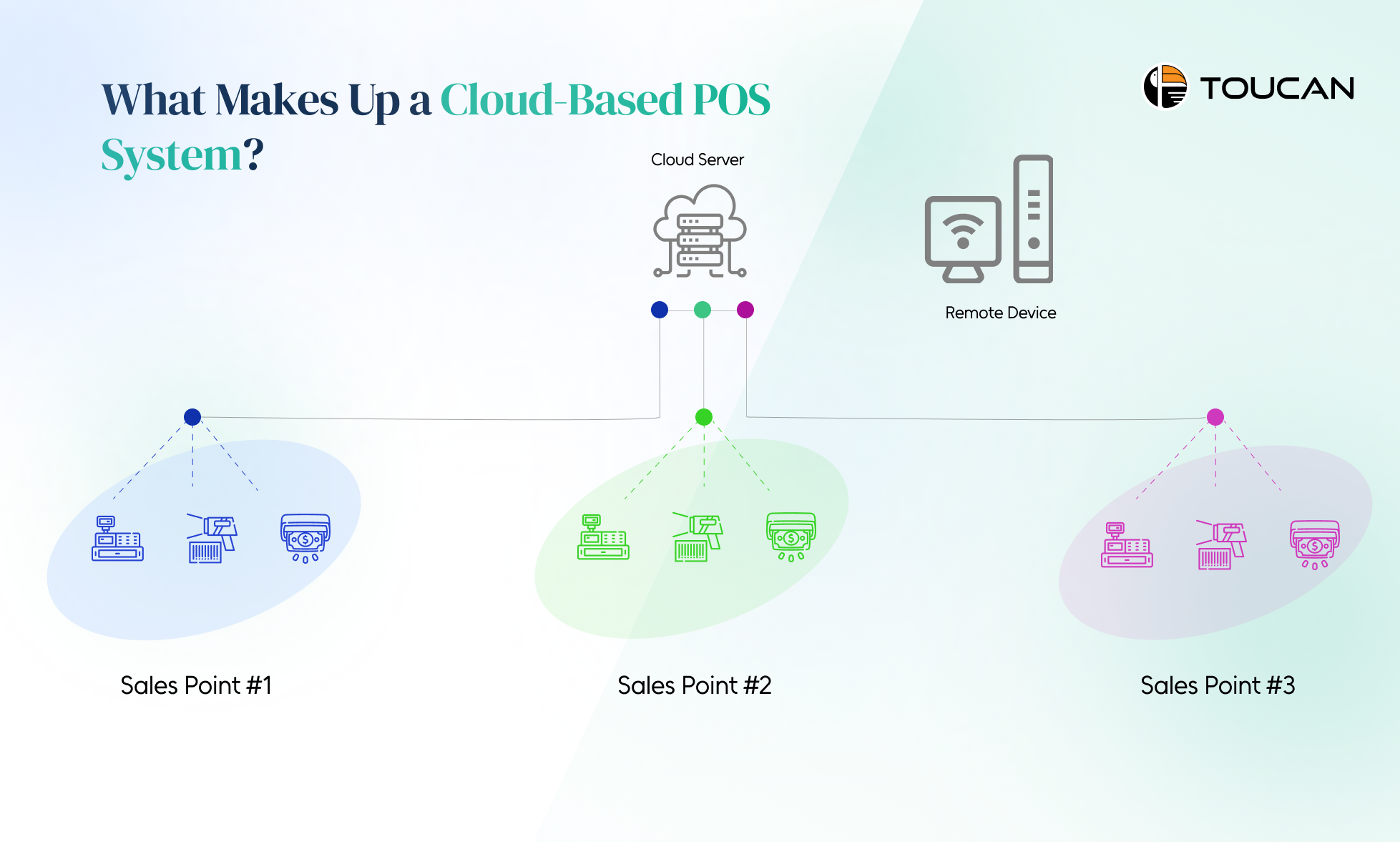Cloud-based POS: What It Is and How It Transforms Your Business
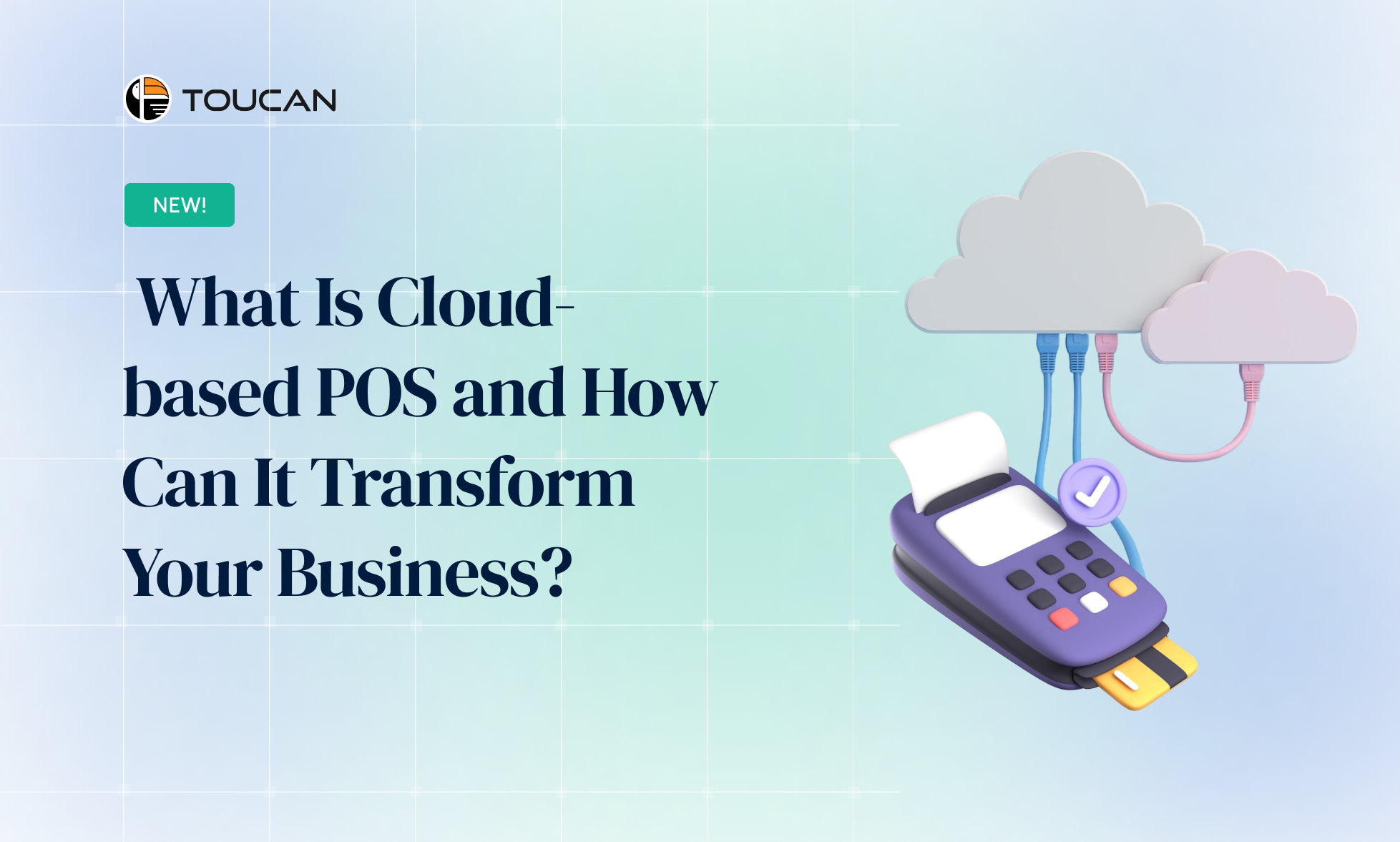
Running a business today is no longer just about ringing up sales—it’s about having the right tools to stay agile, connected, and in control. And that’s exactly where a cloud-based POS system changes the game.
Think of it not as a bulky cash register, but as the brain of your business—powered online, accessible anywhere, and built to grow with you. Unlike traditional setups that keep you tied to your store, a cloud POS system gives you the freedom to track sales, manage inventory, and serve customers from your laptop, tablet, or even your phone.
In short, the best POS software isn’t just about processing payments—it’s about running your entire business smarter, faster, and more securely.
What Is a Cloud-based POS System and How Does It Work?
A cloud-based pos system is more than just a modern cash register—it’s a digital hub that runs entirely online.
Unlike traditional systems that store data on bulky local servers, a cloud POS system keeps everything—transactions, sales reports, and customer details—securely stored in the cloud. This means you can access your business data anytime, anywhere, from any device with an internet connection.
Here’s how it works in practice:
Transaction Processing – When a customer makes a purchase, the POS software instantly processes the payment and syncs it to the cloud.
Real-Time Data Access – Whether you run one store or a chain of outlets, sales, inventory, and customer data update in real-time, keeping all your locations connected.
Centralized Operations – From managing stock levels to tracking staff performance, a cloud POS system centralizes everything into a single, easy-to-use platform.
Remote Access– Owners and managers can log in from their phone, tablet, or laptop to check reports and make decisions without being tied to a physical store.
What Are the Must-Have Features of a Cloud-based POS?
Choosing the right cloud-based POS can be the difference between a system that just takes payments and one that actually helps your business grow.
With so many options out there, it’s important to know what separates a basic tool from the best POS software built for modern businesses.
Here are the must-have features every cloud POS system should include:
- Automatic Updates: No more worrying about outdated systems or downtime. A cloud-based POS updates itself automatically, giving you the newest features, better performance, and stronger security without lifting a finger.
- Data Security and Backups: Business data is sensitive, and losing it can be costly. A good cloud POS system comes with built-in encryption, secure access controls, and regular off-site backups—keeping your information safe even if your local hardware fails.
- Scalability: As your business grows, your point-of-sale system should grow with you. A cloud-based POS makes it easy to add new stores, employees, or features without investing in extra hardware. Flexibility is key to staying ahead.
- Seamless Integrations: The best POS software doesn’t work in isolation. It integrates smoothly with your accounting tools, eCommerce platforms, and inventory management systems. This reduces manual work, avoids errors, and gives you a complete view of your business.
What Makes Up a Cloud-based POS System?
If you’re considering moving to a cloud-based POS, it’s important to understand what’s actually inside the system.
A cloud POS system isn’t just a fancy checkout tool—it’s a mix of hardware and POS software that work together to make running your business simpler, smarter, and faster. Let’s break it down:
1. Hardware Components
- POS Terminals: Tablets, smartphones, or dedicated terminals that let you run sales anywhere—from a busy retail store to a food truck.
- Barcode Scanners: Quick product scans speed up checkout and help you manage stock without errors.
- Receipt Printers & Cash Drawers: Even in the digital age, some customers still want receipts or pay with cash. These connect easily to your POS system.
2. Software Components
This is where the real magic happens. The best POS software isn’t just about transactions—it’s about managing your entire business.
- Sales & Payment Processing: Seamlessly accept payments without juggling multiple systems.
- Inventory Management: Track stock in real time, set alerts, and avoid disappointing customers with “out of stock” surprises.
- Customer Management (CRM): Store purchase histories, build loyalty, and personalize offers that keep customers coming back.
3. Integrations That Save Time
A modern cloud POS system easily connects with accounting software, eCommerce platforms, and even loyalty apps. This means no double data entry, fewer mistakes, and smoother operations across your business.
4. Cloud Infrastructure
At its core, a cloud-based POS runs on secure cloud servers managed by your provider. This means automatic data backups, remote accessibility, and reduced IT costs—so you don’t have to worry about server crashes or losing critical sales data.
Cloud POS vs. Traditional POS: Key Differences
If you’re still relying on a traditional POS setup, you might already feel the limitations—slow updates, no remote access, and the constant fear of data loss.
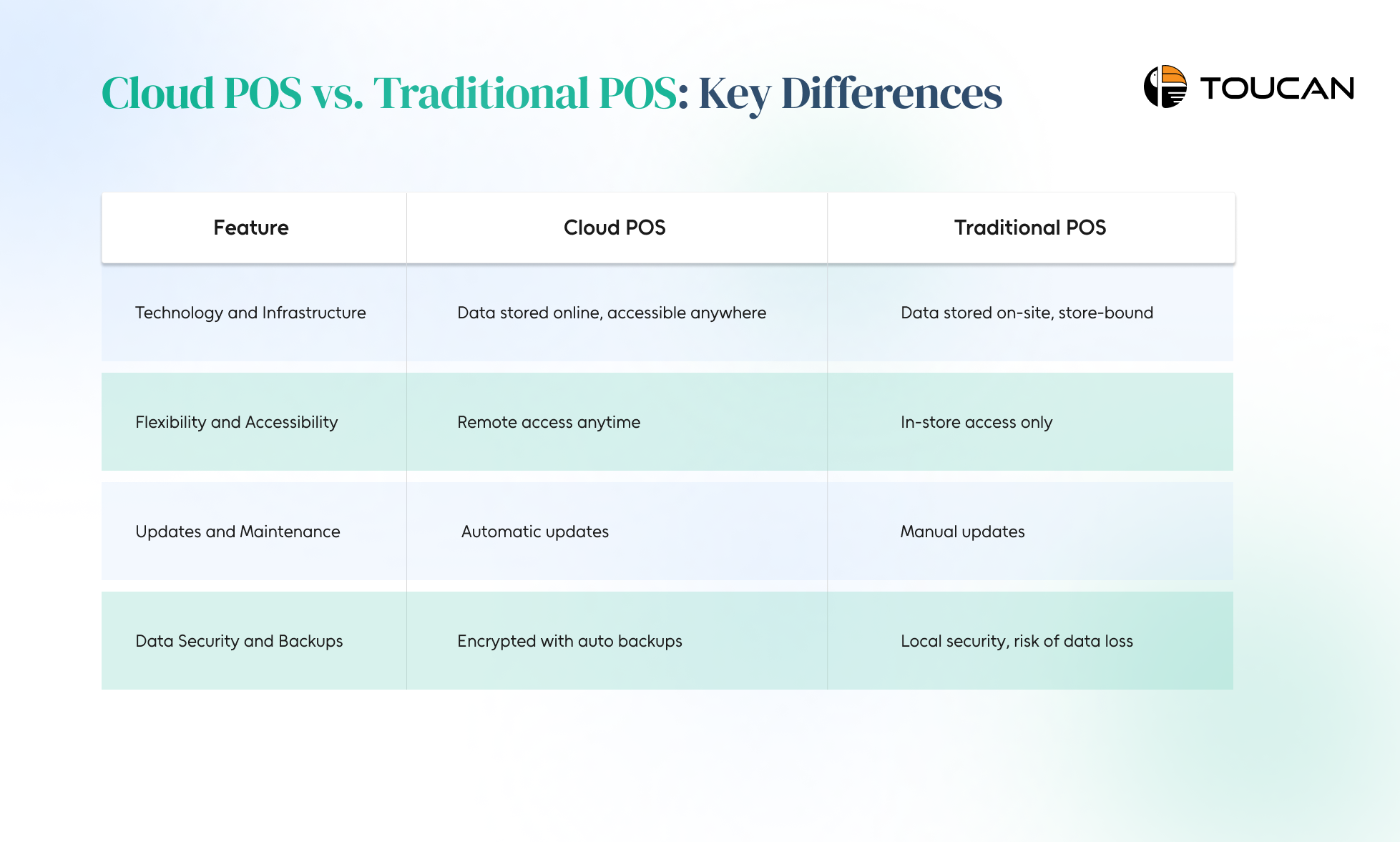
That’s where a cloud- based POS steps in. Let’s break down the key differences so you can see which option actually works best for your business.
1. Technology & Infrastructure
- Cloud Based POS: Runs on secure cloud servers, storing all data online. You just need an internet connection, and everything is accessible from anywhere.
- Traditional POS: Installed on local servers with data stored on-site. No internet needed, but you’re tied to the physical store.
2. Flexibility & Accessibility
- Cloud-Based POS: Check sales, manage staff, or update inventory while sitting at home or even traveling. Remote access is a game-changer for modern businesses.
- Traditional POS: Only works in-store. Want to see yesterday’s numbers? You’ll need to physically be there.
3. Updates & Maintenance
- Cloud POS System: Always up-to-date. Automatic upgrades roll out from the provider, so you get new features and stronger security without lifting a finger.
- Traditional POS: Needs manual updates. If you skip them, you’re stuck with outdated POS software that could slow you down or expose you to risks.
4. Data Security & Backups
- Cloud-Based POS: Comes with built-in encryption and automatic backups. Even if your device crashes, your data is safe in the cloud.
- Traditional POS: Relies on local security. If your system fails or a backup is missed, your business data could be gone for good.
At the end of the day, the choice between a traditional POS and a cloud-based POS comes down to one question: do you want a system that holds your business back, or one that pushes it forward?
A cloud POS system gives you real-time insights, remote access, automatic updates, and the flexibility to scale—everything a modern business needs to thrive. With the best POS software in place, you’re not just accepting payments—you’re building efficiency, improving customer experiences, and setting your business up for long-term growth.
The future of retail, restaurants, and service businesses is already in the cloud—now it’s your move.

